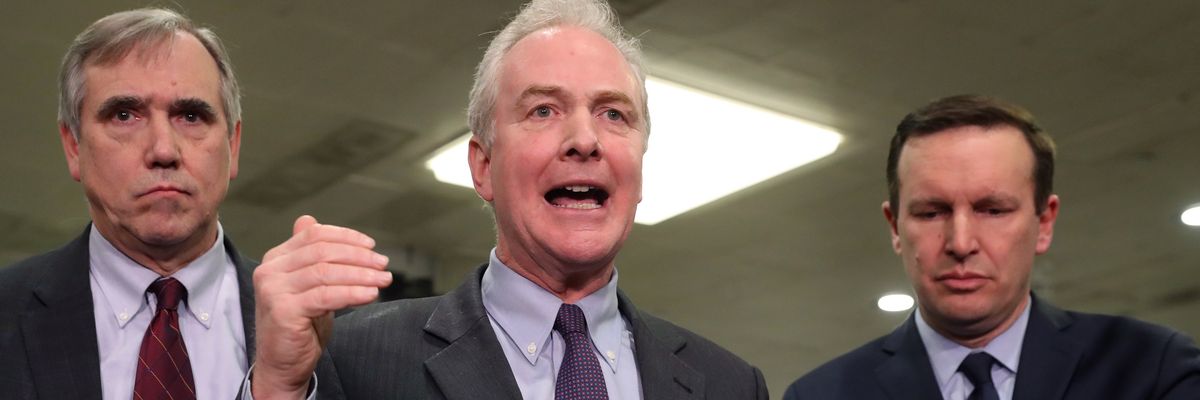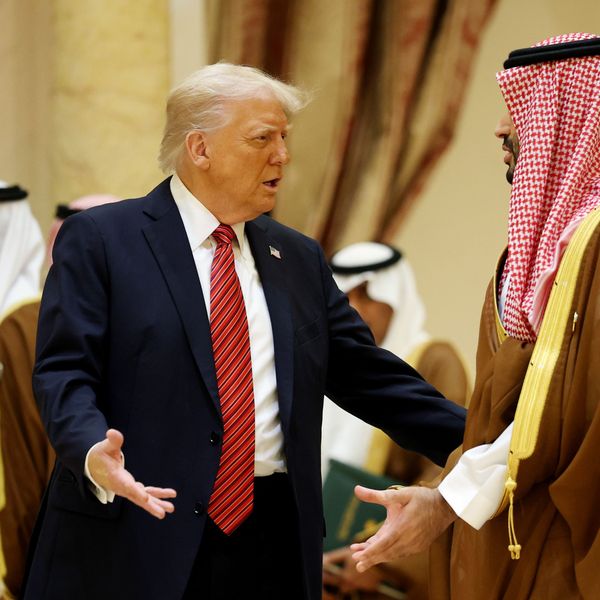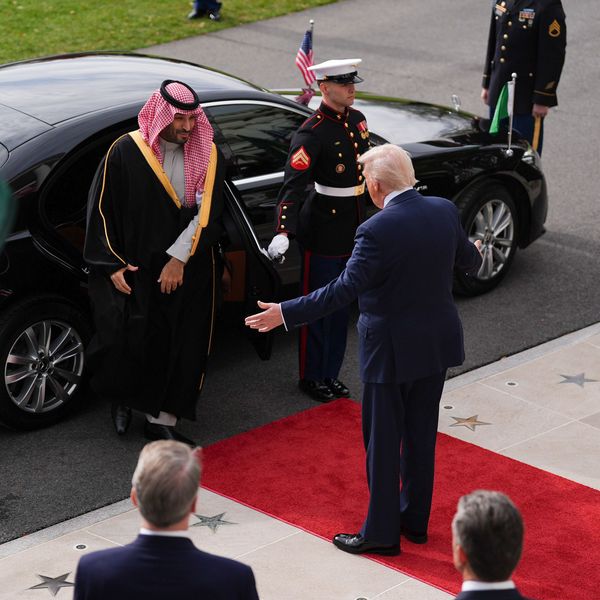
U.S. Sens. Chris Van Hollen (D-Md., center), Chris Murphy (D-Conn., right), and Jeff Merkley (D-Ore., left) are among the 20 senators urging President Joe Biden to "seriously consider" whether to pursue nuclear cooperation with Saudi Arabia.
Senators Express Concerns Over Reports That Saudis Want US Support for Nuclear Program
"We should seriously consider whether it is in U.S. interests to help Saudi Arabia develop a domestic nuclear program," 19 Democratic senators and independent Bernie Sanders wrote.
Amid reports that Saudi Arabia is seeking United States support for its nuclear energy program—whose capacities critics fear could be utilized to develop nuclear weapons—a group of 20 U.S. senators on Wednesday urged President Joe Biden to "seriously consider" whether such a move is in the national interest as the administration brokers a possible normalization deal between the kingdom and Israel.
In addition to concerns over the fundamentalist monarchy's desire for a U.S. security guarantee as a condition for normalizing relations with apartheid Israel, as well as the future of a two-state solution in illegally occupied Palestine, the senators note in a letter to Biden that "the Saudi government is also reportedly seeking U.S. support to develop a civilian nuclear program, and to purchase more advanced U.S. weaponry."
"While we should seriously consider whether it is in U.S. interests to help Saudi Arabia develop a domestic nuclear program, we should always maintain the high bar of the 'gold standard' 123 Agreement and insist on adherence to the Additional Protocol," the senators wrote, referring to a provision of the Atomic Energy Act of 1954 requiring a country seeking a nuclear cooperation deal with the United States to commit to a set of nine nonproliferation criteria and expanded International Atomic Energy Agency (IAEA) inspections. The U.S. has entered into such agreements with more than two dozen countries, Taiwan, and the IAEA.
Citing "the devastating war in Yemen" waged by a U.S.-backed Saudi-led coalition for nearly eight years at the cost of more than 375,000 lives, the senators added that "the provision of more advanced weaponry to Saudi Arabia should be done with careful deliberation to ensure that such equipment only be used for truly defensive purposes and does not contribute to a regional arms race."
The lawmakers' letter was led by Democratic Sens. Chris Murphy (Conn.), Chris Van Hollen (Md.), Dick Durbin (Ill.), and Peter Welch (Vt.). Signatories include Sens. Bernie Sanders (I-Vt.), Elizabeth Warren (D-Mass.), John Fetterman (D-Pa.), Jeff Merkley (D-Ore.), Patty Murray (D-Wash.), and Ed Markey (D-Mass.).
As Center for Strategic & International Studies senior fellow Jane Nakano wrote last month:
The Saudi interest in acquiring nuclear power technology became publicly known around 2010, with a royal decree stipulating that "the development of atomic energy is essential to meet the kingdom's growing requirements for energy to generate electricity, produce desalinated water, and reduce reliance on depleting hydrocarbon resources." Also, having pledged to meet carbon neutrality by 2060, Saudi Arabia looks to nuclear as an important source of zero-emissions electricity.
In addition to the United States, China National Nuclear Corporation of China, Électricité de France of France, Rosatom of Russia, and Korea Electric Power Corporation of South Korea have been in discussions to land the contract to build two inaugural nuclear power units in Saudi Arabia.
"Saudi Arabia has been publicly interested in obtaining the capacity to enrich domestic uranium to establish the entire nuclear fuel cycle, including the production of yellowcake, low enriched uranium, and the manufacturing of nuclear fuel both for both domestic use and exporting," Nakano noted. "While economic diversification through the development of domestic uranium industry may be a genuine interest, Saudi leadership has also shown little opposition to turning nuclear power capacity into developing a nuclear weapon if it deemed necessary to acquire such capability."
"The ongoing Saudi resistance to the U.S. nonproliferation conditions has generated controversy, given Saudi Arabia acceded to the Nuclear Nonproliferation Treaty in 1988—i.e., the country is legally bound to not pursue nuclear weapons," she added.
However, Saudi Crown Prince Mohammed bin Salman (MBS) confirmed last month that if Iran develops a nuclear bomb, "we will have to get one."
Some experts are warning that Saudi Arabia could turn to China or even Russia to help fulfill its nuclear ambitions if it grows wary of U.S. conditions. Hassan Alshehri, a Saudi defense analyst and retired brigadier general, told Breaking Defense that "the West knows that Riyadh has a flexible compass that can guide it to other alternatives to acquire nuclear capabilities if Washington continues with its current negative stance."
Hasan Al Hasan, Middle East research fellow at the International Institute for Strategic Studies, told Breaking Defense that "if MBS and the Biden administration fail to reach an agreement on nuclear limits and security commitments... then Saudi Arabia will likely turn to other partners, notably China and Russia, for help with building the capabilities it needs to restore the balance of power with Iran."
An Urgent Message From Our Co-Founder
Dear Common Dreams reader, The U.S. is on a fast track to authoritarianism like nothing I've ever seen. Meanwhile, corporate news outlets are utterly capitulating to Trump, twisting their coverage to avoid drawing his ire while lining up to stuff cash in his pockets. That's why I believe that Common Dreams is doing the best and most consequential reporting that we've ever done. Our small but mighty team is a progressive reporting powerhouse, covering the news every day that the corporate media never will. Our mission has always been simple: To inform. To inspire. And to ignite change for the common good. Now here's the key piece that I want all our readers to understand: None of this would be possible without your financial support. That's not just some fundraising cliche. It's the absolute and literal truth. We don't accept corporate advertising and never will. We don't have a paywall because we don't think people should be blocked from critical news based on their ability to pay. Everything we do is funded by the donations of readers like you. Will you donate now to help power the nonprofit, independent reporting of Common Dreams? Thank you for being a vital member of our community. Together, we can keep independent journalism alive when it’s needed most. - Craig Brown, Co-founder |
Amid reports that Saudi Arabia is seeking United States support for its nuclear energy program—whose capacities critics fear could be utilized to develop nuclear weapons—a group of 20 U.S. senators on Wednesday urged President Joe Biden to "seriously consider" whether such a move is in the national interest as the administration brokers a possible normalization deal between the kingdom and Israel.
In addition to concerns over the fundamentalist monarchy's desire for a U.S. security guarantee as a condition for normalizing relations with apartheid Israel, as well as the future of a two-state solution in illegally occupied Palestine, the senators note in a letter to Biden that "the Saudi government is also reportedly seeking U.S. support to develop a civilian nuclear program, and to purchase more advanced U.S. weaponry."
"While we should seriously consider whether it is in U.S. interests to help Saudi Arabia develop a domestic nuclear program, we should always maintain the high bar of the 'gold standard' 123 Agreement and insist on adherence to the Additional Protocol," the senators wrote, referring to a provision of the Atomic Energy Act of 1954 requiring a country seeking a nuclear cooperation deal with the United States to commit to a set of nine nonproliferation criteria and expanded International Atomic Energy Agency (IAEA) inspections. The U.S. has entered into such agreements with more than two dozen countries, Taiwan, and the IAEA.
Citing "the devastating war in Yemen" waged by a U.S.-backed Saudi-led coalition for nearly eight years at the cost of more than 375,000 lives, the senators added that "the provision of more advanced weaponry to Saudi Arabia should be done with careful deliberation to ensure that such equipment only be used for truly defensive purposes and does not contribute to a regional arms race."
The lawmakers' letter was led by Democratic Sens. Chris Murphy (Conn.), Chris Van Hollen (Md.), Dick Durbin (Ill.), and Peter Welch (Vt.). Signatories include Sens. Bernie Sanders (I-Vt.), Elizabeth Warren (D-Mass.), John Fetterman (D-Pa.), Jeff Merkley (D-Ore.), Patty Murray (D-Wash.), and Ed Markey (D-Mass.).
As Center for Strategic & International Studies senior fellow Jane Nakano wrote last month:
The Saudi interest in acquiring nuclear power technology became publicly known around 2010, with a royal decree stipulating that "the development of atomic energy is essential to meet the kingdom's growing requirements for energy to generate electricity, produce desalinated water, and reduce reliance on depleting hydrocarbon resources." Also, having pledged to meet carbon neutrality by 2060, Saudi Arabia looks to nuclear as an important source of zero-emissions electricity.
In addition to the United States, China National Nuclear Corporation of China, Électricité de France of France, Rosatom of Russia, and Korea Electric Power Corporation of South Korea have been in discussions to land the contract to build two inaugural nuclear power units in Saudi Arabia.
"Saudi Arabia has been publicly interested in obtaining the capacity to enrich domestic uranium to establish the entire nuclear fuel cycle, including the production of yellowcake, low enriched uranium, and the manufacturing of nuclear fuel both for both domestic use and exporting," Nakano noted. "While economic diversification through the development of domestic uranium industry may be a genuine interest, Saudi leadership has also shown little opposition to turning nuclear power capacity into developing a nuclear weapon if it deemed necessary to acquire such capability."
"The ongoing Saudi resistance to the U.S. nonproliferation conditions has generated controversy, given Saudi Arabia acceded to the Nuclear Nonproliferation Treaty in 1988—i.e., the country is legally bound to not pursue nuclear weapons," she added.
However, Saudi Crown Prince Mohammed bin Salman (MBS) confirmed last month that if Iran develops a nuclear bomb, "we will have to get one."
Some experts are warning that Saudi Arabia could turn to China or even Russia to help fulfill its nuclear ambitions if it grows wary of U.S. conditions. Hassan Alshehri, a Saudi defense analyst and retired brigadier general, told Breaking Defense that "the West knows that Riyadh has a flexible compass that can guide it to other alternatives to acquire nuclear capabilities if Washington continues with its current negative stance."
Hasan Al Hasan, Middle East research fellow at the International Institute for Strategic Studies, told Breaking Defense that "if MBS and the Biden administration fail to reach an agreement on nuclear limits and security commitments... then Saudi Arabia will likely turn to other partners, notably China and Russia, for help with building the capabilities it needs to restore the balance of power with Iran."
Amid reports that Saudi Arabia is seeking United States support for its nuclear energy program—whose capacities critics fear could be utilized to develop nuclear weapons—a group of 20 U.S. senators on Wednesday urged President Joe Biden to "seriously consider" whether such a move is in the national interest as the administration brokers a possible normalization deal between the kingdom and Israel.
In addition to concerns over the fundamentalist monarchy's desire for a U.S. security guarantee as a condition for normalizing relations with apartheid Israel, as well as the future of a two-state solution in illegally occupied Palestine, the senators note in a letter to Biden that "the Saudi government is also reportedly seeking U.S. support to develop a civilian nuclear program, and to purchase more advanced U.S. weaponry."
"While we should seriously consider whether it is in U.S. interests to help Saudi Arabia develop a domestic nuclear program, we should always maintain the high bar of the 'gold standard' 123 Agreement and insist on adherence to the Additional Protocol," the senators wrote, referring to a provision of the Atomic Energy Act of 1954 requiring a country seeking a nuclear cooperation deal with the United States to commit to a set of nine nonproliferation criteria and expanded International Atomic Energy Agency (IAEA) inspections. The U.S. has entered into such agreements with more than two dozen countries, Taiwan, and the IAEA.
Citing "the devastating war in Yemen" waged by a U.S.-backed Saudi-led coalition for nearly eight years at the cost of more than 375,000 lives, the senators added that "the provision of more advanced weaponry to Saudi Arabia should be done with careful deliberation to ensure that such equipment only be used for truly defensive purposes and does not contribute to a regional arms race."
The lawmakers' letter was led by Democratic Sens. Chris Murphy (Conn.), Chris Van Hollen (Md.), Dick Durbin (Ill.), and Peter Welch (Vt.). Signatories include Sens. Bernie Sanders (I-Vt.), Elizabeth Warren (D-Mass.), John Fetterman (D-Pa.), Jeff Merkley (D-Ore.), Patty Murray (D-Wash.), and Ed Markey (D-Mass.).
As Center for Strategic & International Studies senior fellow Jane Nakano wrote last month:
The Saudi interest in acquiring nuclear power technology became publicly known around 2010, with a royal decree stipulating that "the development of atomic energy is essential to meet the kingdom's growing requirements for energy to generate electricity, produce desalinated water, and reduce reliance on depleting hydrocarbon resources." Also, having pledged to meet carbon neutrality by 2060, Saudi Arabia looks to nuclear as an important source of zero-emissions electricity.
In addition to the United States, China National Nuclear Corporation of China, Électricité de France of France, Rosatom of Russia, and Korea Electric Power Corporation of South Korea have been in discussions to land the contract to build two inaugural nuclear power units in Saudi Arabia.
"Saudi Arabia has been publicly interested in obtaining the capacity to enrich domestic uranium to establish the entire nuclear fuel cycle, including the production of yellowcake, low enriched uranium, and the manufacturing of nuclear fuel both for both domestic use and exporting," Nakano noted. "While economic diversification through the development of domestic uranium industry may be a genuine interest, Saudi leadership has also shown little opposition to turning nuclear power capacity into developing a nuclear weapon if it deemed necessary to acquire such capability."
"The ongoing Saudi resistance to the U.S. nonproliferation conditions has generated controversy, given Saudi Arabia acceded to the Nuclear Nonproliferation Treaty in 1988—i.e., the country is legally bound to not pursue nuclear weapons," she added.
However, Saudi Crown Prince Mohammed bin Salman (MBS) confirmed last month that if Iran develops a nuclear bomb, "we will have to get one."
Some experts are warning that Saudi Arabia could turn to China or even Russia to help fulfill its nuclear ambitions if it grows wary of U.S. conditions. Hassan Alshehri, a Saudi defense analyst and retired brigadier general, told Breaking Defense that "the West knows that Riyadh has a flexible compass that can guide it to other alternatives to acquire nuclear capabilities if Washington continues with its current negative stance."
Hasan Al Hasan, Middle East research fellow at the International Institute for Strategic Studies, told Breaking Defense that "if MBS and the Biden administration fail to reach an agreement on nuclear limits and security commitments... then Saudi Arabia will likely turn to other partners, notably China and Russia, for help with building the capabilities it needs to restore the balance of power with Iran."

